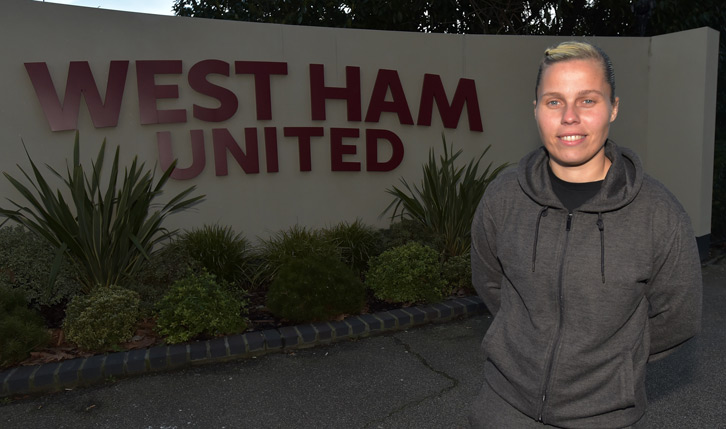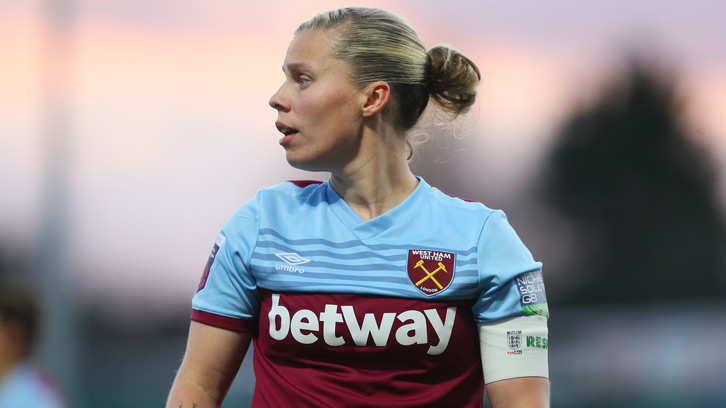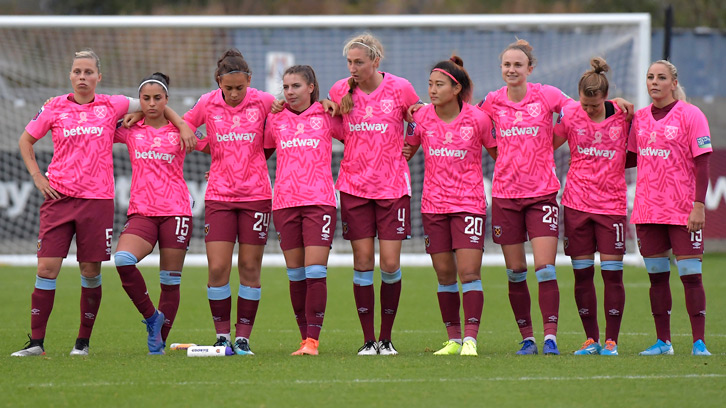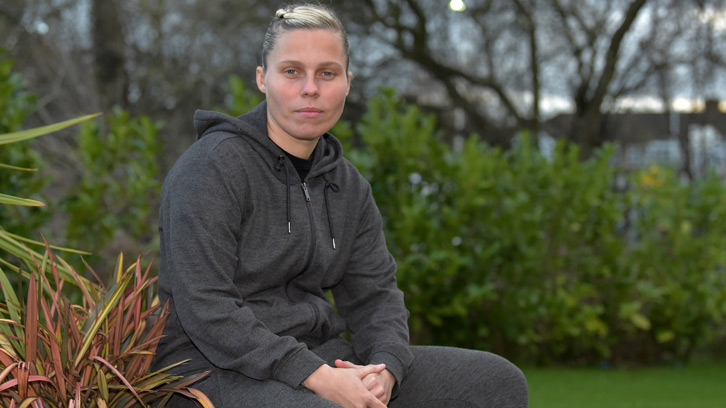
Thursday 6 February. It is just after 10am. Gilly Flaherty is on a scheduled rest day from training, but the West Ham United women’s captain is far from relaxed.
Instead, the defender is looking at her phone, regularly refreshing her Twitter feed. She is waiting, both with excitement and with nerves, for the biggest story of her life to drop into the public sphere.
Seconds are ticking by, but they feel like hours. Finally, the phone chimes. A notification, tagging her personal account.
“Gilly Flaherty has a story to tell…”
Here we go. The story that Gilly had kept locked away for over a decade was finally out there, for friends, family, supporters and the entire world to hear.
In 2007, Gilly Flaherty tried to take her own life. The centre-back, dealing with feelings of isolation and coming to terms with her homosexuality, along with struggles with schoolwork and trying to break into the Arsenal first team, could see no other way out.
It was, by Flaherty’s own admission, the darkest period of her life.
In support of the Heads Up Campaign, Flaherty decided to speak openly, honestly, and publicly about her struggles, in the hope of encouraging a wider dialogue about mental health.
A couple of months on from her story becoming public knowledge, Flaherty still cannot believe the reaction she received.
With Mental Health Awareness Week falling between 18-24 May, the captain knows she opened up on her own battles at the right time.
I was really honest about having doubts about telling my story but I would have regretted it if I hadn’t have come out and talked about it. A part of me even wonders why I didn’t do it sooner.
Gilly Flaherty
“The response that we’ve had from this story has been overwhelming,” West Ham’s No5 said. “It could not have gone any better than how it did.
“We were going into the unknown in terms of what the reaction would be but the amount of people who watched the video, reached out and got in touch with me has been amazing. There were people reaching out to tell me I was brave, people who are going through something similar, or have been through something similar, and friends who felt bad or guilty for not knowing and not being there.
“I was really honest about having doubts about telling my story but, looking at it with hindsight now, I would have regretted it if I hadn’t have come out and talked about it. A part of me even wonders why I didn’t do it sooner.
“But this was the right time. I felt ready. I knew in myself that it was the right time. I was strong enough, regardless of what the outcome would be. I knew I could handle whatever came my way with this.”

Hundreds of thousands of people have seen or read or heard of Flaherty’s personal tale. The West Ham defender has spoken with national newspapers, such as the Guardian, as well as BBC Sport and ITV News, all in order to make sure the conversation around mental health continues.
Before all the attention from supporters, well-wishers and the media, however, there were two groups that Flaherty wanted to make sure knew her story and were aware she was going public: her family and her West Ham teammates.
The day before Flaherty’s story was due to be shared with the world, West Ham United women’s team were gathered to learn about their captain’s impending announcement.
“My teammates saw the video in a meeting before it went out publicly,” Flaherty reflected. “I wasn’t in the room when they watched it, so there was that awkward moment when they came back into the changing room and saw me afterwards.
“All of them, every single one of them, came over to me and gave me a cuddle. They told me they couldn’t believe what I had been through and told me I was brave.
“I felt very vulnerable on the day that they saw it. As captain, I think I have this image that I’m a tough leader, but the players were seeing me talk about times when I was weak, or going through a bad time, and I really didn’t want them to think any differently about me.
“I didn’t want to be seen any differently, but I don’t think they did.”

Next came the moment that Flaherty felt the strongest about. Her family knew her story, but it was time to tell them that everyone else was going to know very soon too.
Prior to Flaherty’s discussions in a public forum, her suicide attempt was something that the family rarely talked about. But the love and support she received reassured Flaherty that opening up was the right thing to do.
She said: “I felt at my most nervous the night before the story went out. I was getting the clips and edits sent through, and I had been waiting for them to be finished so I could tell my family I was talking publicly about my story. Although it was my story, it was going to impact them as well. It was important for me to know that they were okay with how it was being presented.
“I sent my family both videos – the one made by West Ham and the one done by BBC – in our family WhatsApp group, and told them that I wanted them to know that I was talking about my suicide attempt as part of the Heads Up Campaign. I just wanted them to be happy and okay with how it came across.
“Their response was brilliant. They all told me how proud of me they were for speaking up. I think they got a bit upset watching the videos, but that was because I was emotional during them. Ultimately, they are proud of me and they can see a big difference in me from the person I was then and the person I am now.”

Over three months on from going public with her most personal story, Flaherty knows there are more significant things in life than football; than winning or losing. The ongoing global coronavirus [COVID-19] pandemic has reaffirmed that for people all over the world.
For Flaherty though, her own person experiences taught her that a long time ago. Nothing matters more to her than her wellbeing and her family, and it never will.
“When you talk about things like this, it does put it into perspective. Football is not life and death. You win and you lose games, but it’s never going to be more important than someone’s wellbeing, or their life.
“At the end of the day, this is my job, but it’s also a game. If we’re talking about your health, your mental health, your wellbeing or your family, then that comes first. That will always be the priority over any football match.
“When things aren’t going your way in football, then it’s going to be tough, but what is important is how you deal with it and pick yourself up. We have the best job ever and, although we don’t necessarily see it as a job and we know how lucky we are to do this, we still have to work hard every single day and be the best we can be for this team.”
